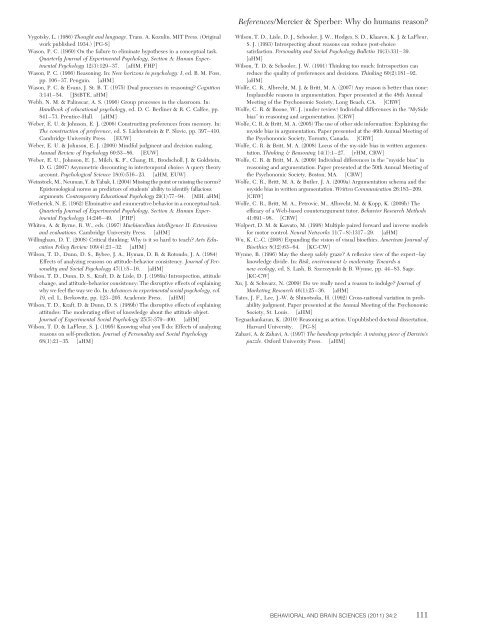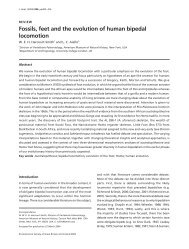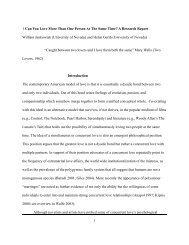References/Mercier & Sperber: <strong>Why</strong> <strong>do</strong> <strong>hum<strong>an</strong>s</strong> <strong>reason</strong>?Stasson, M. F., Kameda, T., Parks, C. D., Zimmerm<strong>an</strong>, S. K. & Davis, J. H. (1991)Effects of assigned group consensus requirement on group problem solving<strong>an</strong>d group members’ learning. Social Psychology Quarterly 54(1):25–35.[aHM]Staw, B. M. (1981) The escalation of commitment to a course of action. Academy ofM<strong>an</strong>agement Review 6(4):577–87. [aHM]Stein, N. L. Bernas, R. S. & Calicchia, D. J. (1997) Conflict talk: Underst<strong>an</strong>ding <strong>an</strong>dresolving arguments. In: Conversation: Cognitive, communicative, <strong>an</strong>d socialperspectives, ed. T. Givon, pp. 233–68. John Benjamins. [aHM]Stein, N. L., Bernas, R. S., Calicchia, D. J. & Wright, A. (1996) Underst<strong>an</strong>ding <strong>an</strong>dresolving arguments: The dynamics of negotiation. In: Models of underst<strong>an</strong>dingtext, ed. B. Britton & A. G. Graesser, pp. 257–88. Erlbaum. [aHM]Steiner, I. D. (1972) Group processes <strong>an</strong>d productivity. Academic Press. [aHM]Sterelny, K. (in press) The evolved apprentice. MIT Press. [aHM]Sternberg, R. J., ed. (2002) <strong>Why</strong> smart people c<strong>an</strong> be so stupid. Yale UniversityPress. [RJS]Sternberg, R. J., Reznitskaya, A. & Jarvin, L. (2007) Teaching <strong>for</strong> wis<strong>do</strong>m: Whatmatters is not just what students know, but how they use it. Lon<strong>do</strong>n Review ofEducation 5(2):143–58. [RJS]Stupple, E. J. N. & Ball, L. J. (2008) Belief-logic conflict resolution in syllogistic<strong>reason</strong>ing: Inspection-time evidence <strong>for</strong> a parallel-process model. Thinking &Reasoning 14:168–81. [EJNS]Sunstein, C. R. (2002) The law of group polarization. Journal of Political Philosophy10(2):175–95. [aHM]Swinney, D. (1979) Lexical access during sentence comprehension: (Re)considerationof context effects. Journal of Verbal Learning <strong>an</strong>d Verbal Behavior18:645–60. [JSU]Taber, C. S. & Lodge, M. (2006) Motivated skepticism in the evaluation of politicalbeliefs. Americ<strong>an</strong> Journal of Political Science 50(3):755–69. [aHM]Taleb, N. N. (2007) The black sw<strong>an</strong>: The impact of the highly improbable. R<strong>an</strong><strong>do</strong>mHouse. [aHM]Talisse, R. B. (2009) Folk epistemology <strong>an</strong>d the justification of democracy. In: Doestruth matter? Democracy <strong>an</strong>d public space, ed. R. Geenens & R. Tinnevelt, pp.41–54. Springer. [KC-CW]Taube, J. S., Muller, R. U. & R<strong>an</strong>ck, J. B., Jr. (1990) Head-direction cells recordedfrom the postsubiculum in freely moving rats. I. Description <strong>an</strong>d qu<strong>an</strong>titative<strong>an</strong>alysis. Journal of Neuroscience 10(2):420–35. [JW]Tesser, A. (1976) Attitude polarization as a function of thought <strong>an</strong>d reality constraints.Journal of Research in Personality 10(2):183–94. [aHM]Tesser, A. & Conlee, M. C. (1975) Some effects of time <strong>an</strong>d thought on attitudepolarization. Journal of Personality <strong>an</strong>d Social Psychology 31(2):262–70.[aHM]Tesser, A. & Leone, C. (1977) Cognitive schemas <strong>an</strong>d thought as determin<strong>an</strong>ts ofattitude ch<strong>an</strong>ge. Journal of Experimental Social Psychology 13(4):340–56.[aHM]Tetlock, P. E. (1998) Close-call counterfactuals <strong>an</strong>d belief-system defenses: I wasnot almost wrong but I was almost right. Journal of Personality <strong>an</strong>d SocialPsychology 75(3):639–52. [aHM]Tetlock, P. E. & Boettger, R. (1989) Accountability: A social magnifier of thedilution effect. Journal of Personality <strong>an</strong>d Social Psychology 57(3):388–98.[aHM]Tetlock, P. E., Lerner, J. S. & Boettger, R. (1996) The dilution effect: Judgmentalbias, conversational convention, or a bit of both? Europe<strong>an</strong> Journal of SocialPsychology 26(6):915–34. [aHM]Tetlock, P. E., Skitka, L. & Boettger, R. (1989) Social <strong>an</strong>d cognitive strategies <strong>for</strong>coping with accountability: Con<strong>for</strong>mity, complexity, <strong>an</strong>d bolstering. Journal ofPersonality <strong>an</strong>d Social Psychology 57(4):632–40. [aHM]Thoma, S. J. & Bebeau, M. (2008) Moral Judgment competency is declining overtime: Evidence from 20 years of defining issues test data. Paper presented tothe Americ<strong>an</strong> Educational Research Association, New York. [DN]Thompson, D. F. (2008) Deliberative democratic <strong>theory</strong> <strong>an</strong>d empirical politicalscience. Annual Review of Political Science 11:497–520. [KC-CW]Thompson, D. V., Hamilton, R. W. & Rust, R. T. (2005a) Feature fatigue: Whenproduct capabilities become too much of a good thing. Journal of MarketingResearch 42(4):431–42. [aHM]Thompson, D. V. & Norton, M. I. (2008) The social utility of feature creep. In:Adv<strong>an</strong>ces in consumer research, vol. 35, ed. A. Lee & D. Som<strong>an</strong>, pp. 181–84.Association <strong>for</strong> Consumer Research. [aHM]Thompson, V. A., Ev<strong>an</strong>s, J. St. B. T. & H<strong>an</strong>dley, S. J. (2005b) Persuading <strong>an</strong>d dissuadingby conditional argument. Journal of Memory <strong>an</strong>d L<strong>an</strong>guage53(2):238–57. [MH, arHM]Thompson, V. A., Newstead, S. E. & Morley, N. J. (2010) Metho<strong>do</strong>logical <strong>an</strong>dtheoretical issues in belief-bias: Implications <strong>for</strong> dual process theories. In: Thescience of <strong>reason</strong>: A festschrift <strong>for</strong> Jonath<strong>an</strong> St. B. T. Ev<strong>an</strong>s, ed. K. I. M<strong>an</strong>ktelow,D. E. Over & S. Elqayam, pp. 309–37. Psychology Press. [EJNS]Thompson, V. A., Striemer, C. L., Reikoff, R., Gunter, R. W. & Campbell, J. I. D.(2003) Syllogistic <strong>reason</strong>ing time: Disconfirmation disconfirmed. PsychonomicBulletin & Review 10(1):184–89. [aHM, EJNS]Thorsteinson, T. J. & Withrow, S. (2009) Does unconscious thought outper<strong>for</strong>mconscious thought on complex decisions? A further examination. Judgment <strong>an</strong>dDecision Making 4(3):235–47. [aHM]Thrun, S. (2003) Robotic mapping: A survey. In: Exploring artificial intelligence inthe new millennium, ed. G. Lakemeyer & B. Nebel, pp. 1–36. Morg<strong>an</strong> Kaufm<strong>an</strong>n.[JW]Tichy, G. (2004) The over-optimism among experts in assessment <strong>an</strong>d <strong>for</strong>esight.Technological Forecasting & Social Ch<strong>an</strong>ge 71(4):341–63. [aHM]Tindale, R. S. & Sheffey, S. (2002) Shared in<strong>for</strong>mation, cognitive load, <strong>an</strong>d groupmemory. Group Processes & Intergroup Relations 5(1):5–18. [aHM]To<strong>do</strong>rov, A. & Ulem<strong>an</strong>, J. S. (2002) Spont<strong>an</strong>eous trait inferences are bound toactors: Evidence from false recognition. Journal of Personality <strong>an</strong>d SocialPsychology 83:1051–65. [JSU]Tolm<strong>an</strong>, E. C. (1948) Cognitive maps in rats <strong>an</strong>d men. Psychological Review55(4):189–208. [JW]Tolmie, A., Howe, C., Mackenzie, M. & Greer, K. (1993) Task design as <strong>an</strong> influenceon dialogue <strong>an</strong>d learning: Primary school group work with object flotation.Social Development 2(3):183–201. [aHM]Tomasello, M., Carpenter, M., Call, J., Behne, T. & Moll, H. (2005) Underst<strong>an</strong>ding<strong>an</strong>d sharing intentions: The origins of cultural cognition. Behavioral <strong>an</strong>d BrainSciences 28(5):675–91. [aHM]Tomkins, S. S. (1965) Affect <strong>an</strong>d the psychology of knowledge. In: Affect, cognition,<strong>an</strong>d personality: Empirical studies, ed. S. S. Tomkins & C. E. Izard, pp. 72–97.Springer. [JAJ]Tooby, J., Cosmides, L., Sell, A., Lieberm<strong>an</strong>, D. & Sznycer, D. (2008) Internalregulatory variables <strong>an</strong>d the design of hum<strong>an</strong> motivation: A computational <strong>an</strong>devolutionary approach. In: H<strong>an</strong>dbook of approach <strong>an</strong>d avoid<strong>an</strong>ce motivation,ed. A. Elliot, pp. 251–71. Psychology Press. [DP]Toplak, M. E. & St<strong>an</strong>ovich, K. E. (2003) Associations between myside bias on <strong>an</strong>in<strong>for</strong>mal <strong>reason</strong>ing task <strong>an</strong>d amount of post-secondary education. AppliedCognitive Psychology 17:851–60. [CRW]Trognon, A. (1993) How <strong>do</strong>es the process of interaction work when two interlocutorstry to resolve a logical problem? Cognition <strong>an</strong>d Instruction 11(3–4):325–45. [aHM]Tversky, A. & Kahnem<strong>an</strong>, D. (1981) The framing of decisions <strong>an</strong>d the psychology ofchoice. Science 211(4481):453–58. [aHM]Tversky, A. & Kahnem<strong>an</strong>, D. (1983) Extensional versus intuitive <strong>reason</strong>ing: Theconjunction fallacy in probability judgment. Psychological Review 90(4):293–315. [aHM]Tversky, A. & Shafir, E. (1992) The disjunction effect in choice under uncertainty.Psychological Science 3(5):305–309. [aHM]Tversky, A., Sattath, S. & Slovic, P. (1988) Contingent weighting in judgment <strong>an</strong>dchoice. Psychological Review 95(3):371–84. [aHM]Twardy, C. R. (2004) Argument maps improve critical thinking. Teaching Philosophy27:95–116. [MH]Tweney, R. D., Doherty, M. E., Worner, W. J., Pliske, D. B., Mynatt, C. R., Gross,K. A. & Arkkelin, D. L. (1980) Strategies of rule discovery in <strong>an</strong> inference task.Quarterly Journal of Experimental Psychology 32(1):109–23. [aHM]Twenge, J. & Campbell, R. (2009) The narcissism epidemic: Living in the age ofentitlement. Free Press. [DN]Ulem<strong>an</strong>, J. S. (2005) On the inherent ambiguity of traits <strong>an</strong>d other mental concepts.In: Other minds: How <strong>hum<strong>an</strong>s</strong> bridge the divide between self <strong>an</strong>d others, ed. B.F. Malle & S. D. Hodges, pp. 253–67. Guil<strong>for</strong>d. [JSU]Ulem<strong>an</strong>, J. S., Newm<strong>an</strong>, L. S. & Moskowitz, G. B. (1996) People as flexibleinterpreters: evidence <strong>an</strong>d issues from spont<strong>an</strong>eous trait inference. In:Adv<strong>an</strong>ces in experimental social psychology, vol. 28, ed. M. P. Z<strong>an</strong>na, pp. 211–79. Academic Press. [JSU]Ulem<strong>an</strong>, J. S., Saribay, S. A. & Gonzalez, C. (2008) Spont<strong>an</strong>eous inferences, implicitimpressions, <strong>an</strong>d implicit theories. Annual Review of Psychology 59:329–60.[JSU]Valdesolo, P. & DeSteno, D. (2008) The duality of virtue: Deconstructing the moralhypocrite. Journal of Experimental Social Psychology 44(5):1334–38. [aHM]v<strong>an</strong> Boxtel, C., v<strong>an</strong> der Linden, J. & K<strong>an</strong>selaar, G. (2000) Collaborative learningtasks <strong>an</strong>d the elaboration of conceptual knowledge. Learning <strong>an</strong>d Instruction10(4):311–30. [aHM]V<strong>an</strong> Gelder, T. (2005) Teaching critical thinking: Some lessons from cognitivescience. College Teaching 53:41–46. [MH]V<strong>an</strong> Gelder, T., Bissett, M. & Cumming, G. (2004) Cultivating expertise in in<strong>for</strong>mal<strong>reason</strong>ing. C<strong>an</strong>adi<strong>an</strong> Journal of Experimental Psychology 58:142–52. [MH]Vinokur, A. (1971) Review <strong>an</strong>d theoretical <strong>an</strong>alysis of the effects of group processesupon individual <strong>an</strong>d group decisions involving risk. Psychological Bulletin76(4):231–50. [aHM]Vinokur, A. & Burnstein, E. (1978) Depolarization of attitudes in groups. Journal ofPersonality <strong>an</strong>d Social Psychology 36(8):872–85. [aHM]Voss, J. F. & V<strong>an</strong> Dyke, J. A. (2001) Argumentation in psychology: Backgroundcomments. Discourse Processes 32:89–111. [CRW]Vygotsky, L. (1978) Mind in society: The development of higher psychologicalprocesses. Harvard University Press. [DK]110 BEHAVIORAL AND BRAIN SCIENCES (2011) 34:2
References/Mercier & Sperber: <strong>Why</strong> <strong>do</strong> <strong>hum<strong>an</strong>s</strong> <strong>reason</strong>?Vygotsky, L. (1986) Thought <strong>an</strong>d l<strong>an</strong>guage. Tr<strong>an</strong>s. A. Kozulin. MIT Press. (Originalwork published 1934.) [PG-S]Wason, P. C. (1960) On the failure to eliminate hypotheses in a conceptual task.Quarterly Journal of Experimental Psychology, Section A: Hum<strong>an</strong> ExperimentalPsychology 12(3):129–37. [aHM, FHP]Wason, P. C. (1966) Reasoning. In: New horizons in psychology: I, ed. B. M. Foss,pp. 106–37. Penguin. [aHM]Wason, P. C. & Ev<strong>an</strong>s, J. St. B. T. (1975) Dual processes in <strong>reason</strong>ing? Cognition3:141–54. [JStBTE, aHM]Webb, N. M. & Palinscar, A. S. (1996) Group processes in the classroom. In:H<strong>an</strong>dbook of educational psychology, ed. D. C. Berliner & R. C. Calfee, pp.841–73. Prentice-Hall. [aHM]Weber, E. U. & Johnson, E. J. (2006) Constructing preferences from memory. In:The construction of preference, ed. S. Lichtenstein & P. Slovic, pp. 397–410.Cambridge University Press. [EUW]Weber, E. U. & Johnson, E. J. (2009) Mindful judgment <strong>an</strong>d decision making.Annual Review of Psychology 60:53–86. [EUW]Weber, E. U., Johnson, E. J., Milch, K. F., Ch<strong>an</strong>g, H., Brodscholl, J. & Goldstein,D. G. (2007) Asymmetric discounting in intertemporal choice: A query <strong>theory</strong>account. Psychological Science 18(6):516–23. [aHM, EUW]Weinstock, M., Neum<strong>an</strong>, Y. & Tabak, I. (2004) Missing the point or missing the norms?Epistemological norms as predictors of students’ ability to identify fallaciousarguments. Contemporary Educational Psychology 29(1):77–94. [MH, aHM]Wetherick, N. E. (1962) Eliminative <strong>an</strong>d enumerative behavior in a conceptual task.Quarterly Journal of Experimental Psychology, Section A: Hum<strong>an</strong> ExperimentalPsychology 14:246–49. [FHP]Whiten, A. & Byrne, R. W., eds. (1997) Machiavelli<strong>an</strong> intelligence II: Extensions<strong>an</strong>d evaluations. Cambridge University Press. [aHM]Willingham, D. T. (2008) Critical thinking: <strong>Why</strong> is it so hard to teach? Arts EducationPolicy Review 109(4):21–32. [aHM]Wilson, T. D., Dunn, D. S., Bybee, J. A., Hym<strong>an</strong>, D. B. & Roton<strong>do</strong>, J. A. (1984)Effects of <strong>an</strong>alyzing <strong>reason</strong>s on attitude-behavior consistency. Journal of Personality<strong>an</strong>d Social Psychology 47(1):5–16. [aHM]Wilson, T. D., Dunn, D. S., Kraft, D. & Lisle, D. J. (1989a) Introspection, attitudech<strong>an</strong>ge, <strong>an</strong>d attitude-behavior consistency: The disruptive effects of explainingwhy we feel the way we <strong>do</strong>. In: Adv<strong>an</strong>ces in experimental social psychology, vol.19, ed. L. Berkowitz, pp. 123–205. Academic Press. [aHM]Wilson, T. D., Kraft, D. & Dunn, D. S. (1989b) The disruptive effects of explainingattitudes: The moderating effect of knowledge about the attitude object.Journal of Experimental Social Psychology 25(5):379–400. [aHM]Wilson, T. D. & LaFleur, S. J. (1995) Knowing what you’ll <strong>do</strong>: Effects of <strong>an</strong>alyzing<strong>reason</strong>s on self-prediction. Journal of Personality <strong>an</strong>d Social Psychology68(1):21–35. [aHM]Wilson, T. D., Lisle, D. J., Schooler, J. W., Hodges, S. D., Klaaren, K. J. & LaFleur,S. J. (1993) Introspecting about <strong>reason</strong>s c<strong>an</strong> reduce post-choicesatisfaction. Personality <strong>an</strong>d Social Psychology Bulletin 19(3):331–39.[aHM]Wilson, T. D. & Schooler, J. W. (1991) Thinking too much: Introspection c<strong>an</strong>reduce the quality of preferences <strong>an</strong>d decisions. Thinking 60(2):181–92.[aHM]Wolfe, C. R., Albrecht, M. J. & Britt, M. A. (2007) Any <strong>reason</strong> is better th<strong>an</strong> none:Implausible <strong>reason</strong>s in argumentation. Paper presented at the 48th AnnualMeeting of the Psychonomic Society, Long Beach, CA. [CRW]Wolfe, C. R. & Boone, W. J. (under review) Individual differences in the “MySidebias” in <strong>reason</strong>ing <strong>an</strong>d argumentation. [CRW]Wolfe, C. R. & Britt, M. A. (2005) The use of other side in<strong>for</strong>mation: Explaining themyside bias in argumentation. Paper presented at the 46th Annual Meeting ofthe Psychonomic Society, Toronto, C<strong>an</strong>ada. [CRW]Wolfe, C. R. & Britt, M. A. (2008) Locus of the my-side bias in written argumentation.Thinking & Reasoning 14(1):1–27. [rHM, CRW]Wolfe, C. R. & Britt, M. A. (2009) Individual differences in the “myside bias” in<strong>reason</strong>ing <strong>an</strong>d argumentation. Paper presented at the 50th Annual Meeting ofthe Psychonomic Society, Boston, MA. [CRW]Wolfe, C. R., Britt, M. A. & Butler, J. A. (2009a) Argumentation schema <strong>an</strong>d themyside bias in written argumentation. Written Communication 26:183–209.[CRW]Wolfe, C. R., Britt, M. A., Petrovic, M., Albrecht, M. & Kopp, K. (2009b) Theefficacy of a Web-based counterargument tutor. Behavior Research Methods41:691–98. [CRW]Wolpert, D. M. & Kawato, M. (1998) Multiple paired <strong>for</strong>ward <strong>an</strong>d inverse models<strong>for</strong> motor control. Neural Networks 11(7–8):1317–29. [aHM]Wu, K. C.-C. (2008) Exp<strong>an</strong>ding the vision of visual bioethics. Americ<strong>an</strong> Journal ofBioethics 8(12):63–64. [KC-CW]Wynne, B. (1996) May the sheep safely graze? A reflexive view of the expert–layknowledge divide. In: Risk, environment & modernity: Towards <strong>an</strong>ew ecology, ed. S. Lash, B. Szerszynski & B. Wynne, pp. 44–83. Sage.[KC-CW]Xu, J. & Schwarz, N. (2009) Do we really need a <strong>reason</strong> to indulge? Journal ofMarketing Research 46(1):25–36. [aHM]Yates, J. F., Lee, J.-W. & Shinotsuka, H. (1992) Cross-national variation in probabilityjudgment. Paper presented at the Annual Meeting of the PsychonomicSociety, St. Louis. [aHM]Yegnash<strong>an</strong>kar<strong>an</strong>, K. (2010) Reasoning as action. Unpublished <strong>do</strong>ctoral dissertation,Harvard University. [PG-S]Zahavi, A. & Zahavi, A. (1997) The h<strong>an</strong>dicap principle: A missing piece of Darwin’spuzzle. Ox<strong>for</strong>d University Press. [aHM]BEHAVIORAL AND BRAIN SCIENCES (2011) 34:2 111




